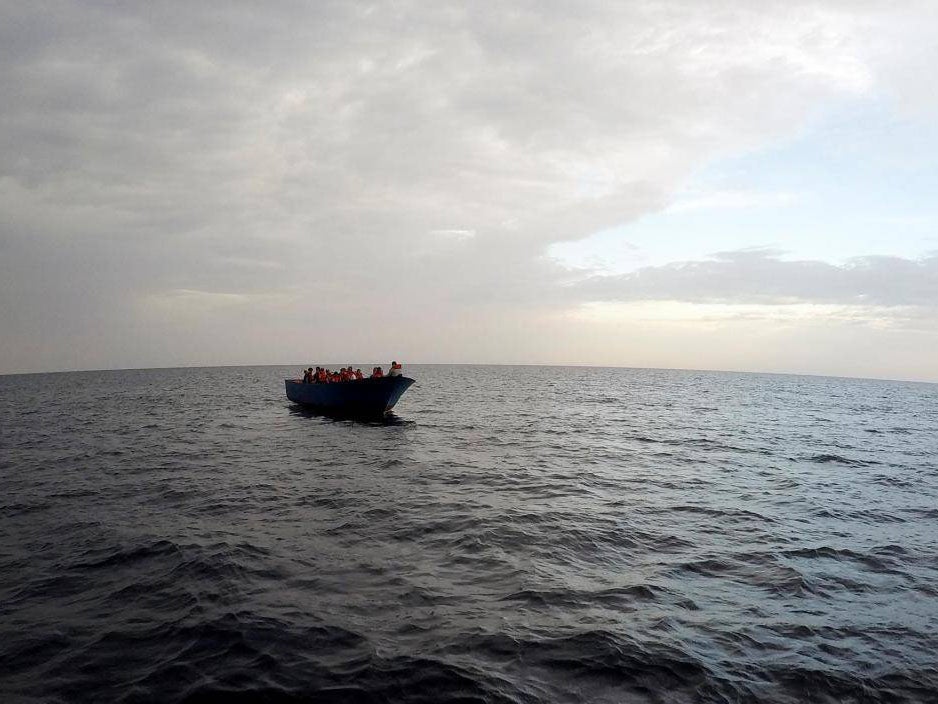As this week's latest tragedy proves, the EU has been found wanting in the case of the migrant crisis
These are not people who have been duped by people smugglers – they are people who have no choice

That a further 90 migrants are feared to have drowned while attempting to cross the Mediterranean from Libya is a reminder that the great movement of humanity across and into Europe is far from over. The measures that have been put in place to deal with the flow are not working, which is why so many end up in the camps of Calais and around other Channel ports. The underlying reasons why they have been fleeing their homeland, and are still seeking a better life in the West remain.
Last year some 3,000 lost their lives in the Med; the signs are that the number will rise in 2018. Indeed, there is some evidence that while migrant numbers are down from their peak during the Syrian civil war, the death rate has been increasing, as the people traffickers have even less of a financial incentive to ensure their safe crossing.
So the position is, in effect, as appalling as ever. Though the numbers move around, scores of people – innocent refugees and economic migrants, including children – are dying every week. Details of the latest loss of life are unconfirmed, and there will never be a definitive figure for the total loss of life in this incident, as has been the case so often before.
In this case it would seem, according to the only three known survivors, that most of those who drowned were Pakistani nationals, and some Libyans, an unusual feature as Libya is very much a transit point for those who have made much longer journeys across the Sahara and from the Middle East and Asia.
Branded “inhumane” by the UN, an EU initiative to assist the Libyan coastguard intercept and return migrants has clearly not been working, even on its own terms. Why European leaders ever supposed that refugees dumped back on the Libyan coast would somehow have the will, let alone the funds, to travel back to their places of origin, is open to debate. They should also know that in many cases war, natural disaster, persecution or extreme economic hardship make return a practical impossibility in any case.
The point is obvious here. Those who choose to make this journey are desperate. Many will realise all too well the risks involved, the ulterior base motives of the traffickers, the hostility of “host” countries, and the expense of bribing officials. They are not, on the whole, duped by the people smugglers, but understand simply that they have no choice. Introducing a more brutal regime in the Mediterranean would make little difference to these sorts of life-and-death calculations for many economic migrants and refugees. There are no penalties that can be practically applied to them; and simply returning them to Libya or other transit places for another attempt is futile – just as we have discovered with the various walls and fences erected around Calais.
The West’s response needs to move much closer to the source of these mass movements of people. The British Government, for example, is right to want to direct aid towards hugely overcrowded refugee settlements in places such as Lebanon, Jordan and Bangladesh. The West also needs to bring ever more pressure to bear on regimes that have created needless refugee crises – those ruling Myanmar and Syria are the most obvious examples today.
Some governments need much more help in combating the terror that has driven citizens out of homes they have no wish to leave, such as Boko Haram in Nigeria and Mali.
The lesson in all of these cases is clear. Diplomatic and political efforts, humanitarian relief, development aid and military effort, according to the circumstances of each blighted nation, will help stem the flow of people that is so difficult to control and which so many in Europe find alarming – and which can sometimes lead to extreme rightist reaction and violence, as the Darren Osborne cases shows.
The danger now is that people in the West lose their sense of shock and shame about such events as the deaths of 90 innocent men, women and children. The horror of the drownings has begun to be blunted by familiarity. The Independent led the world in the reporting on the death of the toddler Alan Kurdi in 2015 and it spurred a global response. The uncomfortable feeling is that it might not do the same today.
It is a fact of life that the public has become inured to such events, because they keep happening, after all. That there may be an increasing number of Libyans joining the various other nationalities on rickety vessels is an important and worrying development; but it only underlines the fundamental failures of the West to deal with such a crisis in so many broken countries where earlier intervention has not worked.
In the end of the migrant crisis is a simple matter of defending human rights and saving lives, and the EU, in the Mediterranean, has been found wanting.

Join our commenting forum
Join thought-provoking conversations, follow other Independent readers and see their replies